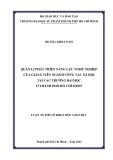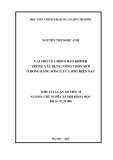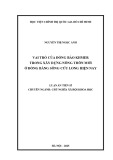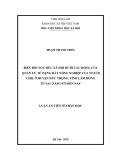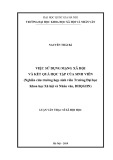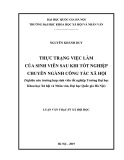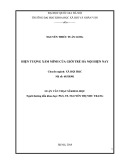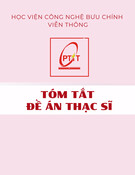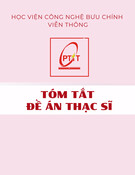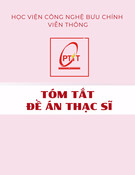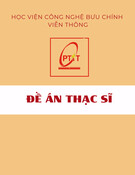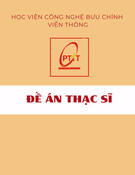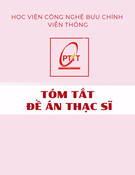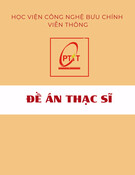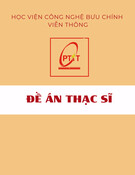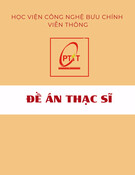
Evaluating Climate Change Mitigation and Adaptation
Considerations in the Victorian Planning System,
Australia
A thesis submitted in fulfilment of the requirements for the degree of
Master of Social Science
Olusegun Yussuff
M.Sc. in Urban and Regional Planning, University of Lagos, Nigeria
B.Tech. in Urban and Regional Planning, Ladoke Akintola University of Technology,
Nigeria
School of Global, Urban and Social Studies
College of Design and Social Context
RMIT University
October 2019

ii
Dedication
To God, the Father, Son, and Holy Spirit
To my late Dad, Honourable Justice R.Oladepo Yussuff

iii
Declaration
I certify that except where due acknowledgement has been made, this research is that of the
author alone; the content of this research submission is the result of work which has been
carried out since the official commencement date of the approved research program; any
editorial work, paid or unpaid, carried out by a third party is acknowledged; and, ethics
procedures and guidelines have been followed.
In addition, I certify that this submission contains no material previously submitted for award
of any qualification at any other university or institution, unless approved for a joint-award
with another institution, and acknowledge that no part of this work will, in the future, be used
in a submission in my name, for any other qualification in any university or other tertiary
institution without the prior approval of the University, and where applicable, any partner
institution responsible for the joint-award of this degree.
I acknowledge that copyright of any published works contained within this thesis resides with
the copyright holder(s) of those works.
I give permission for the digital version of my research submission to be made available on the
web, via the University’s digital research repository, unless permission has been granted by the
University to restrict access for a period of time.
Olusegun Yussuff
1 October 2019

iv
Acknowledgements
It would have been difficult for me to complete this Research Master’s thesis if not for the
considerable efforts and consistent support of some people who have made this significant
journey of my life possible. First and foremost, I would like to express my deepest gratitude to
my supervisors, Dr Melissa Neave, Associate Professor Susie Moloney, and Associate
Professor Andrew Butt, who provided remarkable support and guidance throughout my
research journey.
My most profound appreciation goes to Associate Professor Georgina Heydon, Dr Georgia
Garrard and Associate Professor Andrew Butt, who chaired my milestone seminars. In
addition, Professor Wendy Steele and Dr Brian Coffey were my independent assessors.
I am grateful to the administrative and academic staff in the School of Global, Urban and Social
Studies (GUSS) for their assistance in every aspect of my study. Most especially the Higher
Degree Research (HDR) Programme Manager, Associate Professor Georgina Heydon; your
support and assistance on my candidature came when I needed it most. Special thanks also go
to other staff, Jenni Morris, Cassie Coates and Clare Thompson. To my fellow HDR students
and friends, Leul Tadessel Sidelil, Sadaf Saeed and Louisiana Paganelli Silva. I cherish the
relationship we have built over this research period.
A special appreciation goes to my beloved wife, Dideoluwa Comfort and my two adorable
daughters, Tolunimi Avivah and Inimiloluwa Maranatha, for their unconditional support,
encouragement and understanding throughout my master’s thesis study journey.

v
Table of Contents
Dedication ............................................................................................................................................... ii
Declaration ............................................................................................................................................. iii
Acknowledgements .................................................................................................................................iv
Table of Contents ..................................................................................................................................... v
List of Abbreviation ................................................................................................................................ix
List of Tables ........................................................................................................................................... x
List of Figures .........................................................................................................................................xi
Abstract .................................................................................................................................................... 1
CHAPTER ONE: INTRODUCTION...................................................................................................... 3
1.1 Research Context ........................................................................................................................ 3
1.1.1 Background of the research ........................................................................................................................ 3
1.1.2 Is the Existing Planning Framework in Victoria, Australia Capable of Responding to Climate Change? 7
1.2 Rationale of the study ........................................................................................................................ 9
1.3 Research Purpose ............................................................................................................................. 10
1.4 Research Objectives ......................................................................................................................... 11
1.5 Research Questions .......................................................................................................................... 11
1.6 Study Scope ..................................................................................................................................... 11
1.7 Overview of Research Design ......................................................................................................... 12
1.8 Overview of Case Study .................................................................................................................. 13
1.8.1 Background to Case Study ....................................................................................................................... 13
1.8.2 Policy Context of Case Study ................................................................................................................... 14
1.9 Structure of the Thesis ..................................................................................................................... 16
CHAPTER TWO: CLIMATE CHANGE AND THE LAND USE PLANNING CONTEXT: A
REVIEW OF LITERATURE ................................................................................................................ 17
2.1 Overview .......................................................................................................................................... 17
2.2 Planning for Climate Change ........................................................................................................... 17
2.2.1 Climate Change and Cities ....................................................................................................................... 19
2.2.2 Climate Change and Vulnerability Assessment ....................................................................................... 26
2.2.3 Mitigating greenhouse gas (GHGs) emissions through land-use planning .............................................. 28
2.2.4 Adapting to Climate Change through land-use planning ......................................................................... 30
2.3 Integrating Climate Change Mitigation and Adaptation in Cities ................................................... 33
2.3.1 Synergies, Conflicts and Trade-offs between Climate Change Mitigation and Adaptation .................... 36
2. 4 Challenges to Planning for Climate Change Mitigation and Adaptation ....................................... 39
2.5 Plan Evaluation Research ................................................................................................................ 41
2.5.1 Evaluating climate change mitigation and adaptation in land-use plans.................................................. 45
2.5.2 Awareness-Analysis-Action (3As) Evaluation Framework ..................................................................... 46



